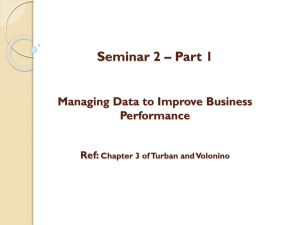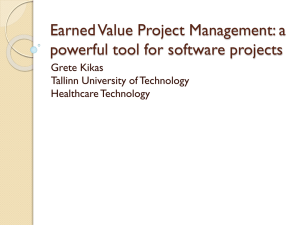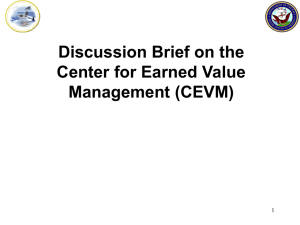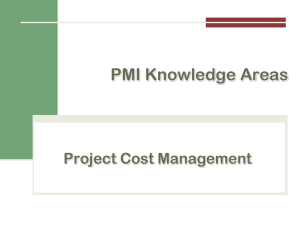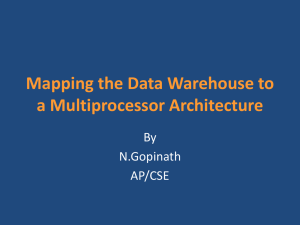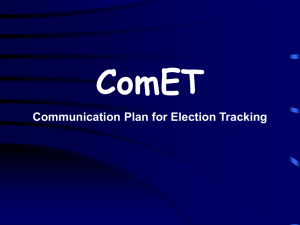EVM Tracking Application
advertisement
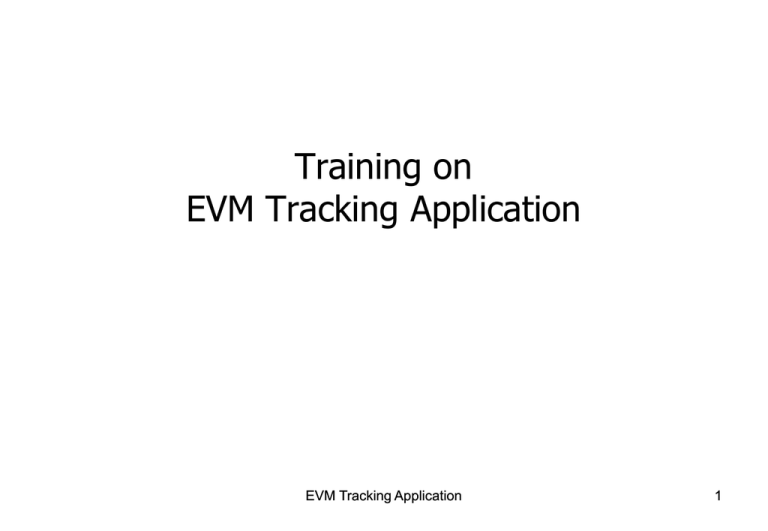
Training on EVM Tracking Application EVM Tracking Application 1 Presentation Contents Introduction of EVM Application Creation of Warehouse at DEO level Data Entry of CU and BU in Warehouse at Warehouse Incharge (WI) level Creation of Login ids and reset pwd of WI by DEO Inter State/Intra State/ Intra district transfer of CU and BU Distribution of CU and BU at Warehouse (AC Strong room type) and Polling Station level for elections Training Methodology EVM Tracking Application 2 INTRODUCTION • • • • • • • • • • EVM Tracking entry application is developed for creating a centralized database for CU and BU’s distributed across 35 states and UTs of India. This Application has to be used at CEO/DEO/Warehouse In-charge/ ECI Admin levels. It allows Tracking of Control Unit and Ballot Unit and their location. This application has the facility to create and enter the warehouse details and stock entry of CU and BU. Transfer of CU and BU once entered will not require re-entry of data. It also keeps the check of duplicate entry of CU and BU in all the warehouses across the country. Various Status messages for the CU and BU are being provided. Transfer of machines at the State level, District level and the warehouse level can be initiated by the authorized personnel. Supply orders are generated for each transfer; the source and destination entities can access the order and proceed with the operation. All the officials assisting in this purpose must adhere to the process to accomplish successful transfer of both CUs and BUs. For the purpose of elections, the CUs and BUs sent to the polling stations are randomized at two different levels – Warehouse ( Strong room type) level and Warehouse (strong room for AC). The machines which are working and successfully passed at both the first level and second level checks will be sent to the polling stations. Reports for monitoring purpose are available only at WI/DEO/CEO/Admin level EVM Tracking Application 3 Checklist of IT Infrastructure required to run the application One computer (Preferably P4 and higher configuration) Operating System : Windows 2000 or above Install .NET Framework - Available for download at http://eci.nic.in/, Click on “election commission Officers Page” link on this page and login using original CEO/DEO username and password Install Crystal Reports Runtime - Available for download at http://eci.nic.in/, Click on “election commission Officers Page” link on this page and login using the original CEO/DEO username and original password which is also used for downloading the EVM Data Entry application Internet broadband connection EVM Tracking Application 4 1. Download EVM Application from http://eci.nic.in/, Click on “Election Commission Officers Page” link on this page and 2. Login using EVM Application original DEO/CEO username and original password . 3. Under the heading Downloads - Click on “EVM Data Entry Application Version .. ” link to download. 4. CEO/DEO will further distribute the installers to WI. EVM Tracking Application 5 Update to latest Version: If you see message shown below, that means a new version of application is launched and the new version will automatically download for you. If for some reason the automatic update is unsuccessful, please download the new version manually from ECI website. Then first uninstall the old version and then install the newer one. EVM Tracking Application 6 To Install double click the installer file “EVMDataEntry.msi”- Open Application from (A Shortcut will also be created automatically in Desktop) All Programs->EVM Tracking EVM Tracking Application 7 Login Screen: It begins with validation page where the credentials entered by the WI/DEO/CEO/Admin. You can access the manual by clicking on “User Manual” link EVM Tracking Application 8 If wrong Username/password is entered, then user has to input text from the image along with username and password. EVM Tracking Application 9 The application opens main page to display the following options under Data Entry Form This page provides the menu to navigate through the application. Following are the menu items: Reports for monitoring purpose are available only at WI/DEO/CEO/Admin level ADMIN LEVEL CEO LEVEL DEO LEVEL WARE HOUSE INCHARGE LEVEL EVM Tracking Application 10 Warehouse Master Invoked at DEO level: - DEO ->Warehouse Master>Enter Round Schedule. This form provides following facilities: a. Enter new warehouse details. b. Search an existing warehouse. c. Modify the details of an existing warehouse. d. Can create 3 types of Warehouses (Warehouse, Strong Room and Strong Room for AC) EVM Tracking Application 11 Master Stock Register Data : It is evoked at DEO and WI level: - DEO/WareHouse >>Master Stock Register Data Entry ->> This form provides following facilities: a. Enter new master stock data. b. Search an existing master stock data. c. Modify the details of an existing master stock data EVM Tracking Application 12 Search and Request Deletion (DEO): It is evoked at DEO level: - DEO >>Search and Request Deletion >> This form provides following facilities: Select the records DEO wants to delete. The selected records will not be deleted from the warehouse as yet. The request of deletion should be sent to ECI(Admin) to Mr K N Bhar (Secretary) email: knbhar@eci.gov.in and then they can finally delete the record. EVM Tracking Application 13 Creation of Warehouse In-charge id: The data entry of CUs and BUs which was earlier done at the DEO level will now be done by the warehouse in-charge only. The user id of the warehouse in-charge will be generated by the DEO. The password can also be reset by the DEO. Hence any requests for resetting the password of the warehouse in-charge must be sent to the DEO only. 1. Once the DEO successfully logs into his account, he can go to the Create and Update users sub-menu of the DEO menu on the main menu page. He will then be able to see a list of warehouses under his district. He can create the user-id of the warehouse in-charge. 2. The DEO can click on the Create User Button to create the user id of the warehouse in-charge. He can also reset the password by clicking on the reset password button. EVM Tracking Application 14 Transfer of CU & BU: Inter-State transfer of CU/BU is initiated by the EVM ADMIN at the Commission’s office. Inter – State Transfer of CU/BU EVM Tracking Application 15 1. Inter-State transfer of CU/BU is initiated by the EVM ADMIN at the Commission office. 2. On successful login, the Admin can choose the Inter – State Transfers option in the main menu page. EVM Tracking Application 16 1. The Admin should choose the source state and the destination state for the transfer of the machine. 2. Also the no. of CUs and BUs to be transferred is to be provided. The availability of the no. of machines available with the source state can be checked by 3. clicking on the Available button. The no. of machines of each type (BEL/ECIL) and as per their year of manufacture (pre 2006/post 2006) can be distinctly viewed. Checking availability of CU/BU in the source state EVM Tracking Application 17 1. The Generate Order button should be clicked to generate the order and start the process. Once the order is generated, the same is indicated to the source & destination state. 2. The following order will be generated which, as indicated, goes to the CEO of both the source and destination state. •This order can also been seen under the Reports section in History > Supply Orders. •The CEO of the destination state must now login to check the supply order and initiate the process on his end. 3.On successful login, the CEO can check the New Supply Orders sub-menu, under CEO menu on the main menu page. 4.Under the Orders section, the destination state’s CEO can view the new order generated by the Admin. He must now indicate the district(s) in which he would like to receive the CUs & BUs EVM Tracking Application 18 1. The CEO must first select the order by clicking on the Select button and then choose the district and the quantity of CU and BU which he would like to distribute in the state. He may choose to provide all CU and BU to the same district or distribute it among a no. of districts. 2. Once the choice is made, the CEO must click on allocate. A report for the same is generated as shown in the next slide. This report can either be seen and printed immediately or later from the reports section. The History report in the reports section will provide the details of all the transfers received from or made to any of the states along with the details of the districts. EVM Tracking Application 19 1. This report, as indicated, is received by the source state who must then map the source district from his state that will be sending the desired no. of machines to the destination district as chosen by the destination state. A copy is marked to the DEOs of the destination districts as well. 2. The source state must now map the source district and the destination district for the transfer of the CU and BU. 3. The CEO of source state must again go to the New Supply Orders section for the District Mapping. Under the District mapping tab, the relevant supply order reference number must be selected which will automatically show the relevant destination state & the destination district chosen by that state. The CEO of source state must now indicate the transfer of machines from one or more of his districts. 4.The order of each destination must first be selected and corresponding to it the no. of machines to be transferred from the source district along with the desired source district must be selected. The data must then be saved. Once successfully saved, the corresponding order will be removed from the Distribute EVM section. The same procedure is to be followed for each order individually. EVM Tracking Application 20 1. The source state must now map the source district and the destination district for the transfer of the CU and BU. 2. The CEO of source state must again go to the New Supply Orders section for the District Mapping. Under the District mapping tab, the relevant supply order reference number must be selected which will automatically show the relevant destination state & the destination district chosen by that state. The CEO of source state must now indicate the transfer of machines from one or more of his districts. 3.The order of each destination must first be selected and corresponding to it the no. of machines to be transferred from the source district along with the desired source district must be selected. The data must then be saved. Once successfully saved, the corresponding order will be removed from the Distribute EVM section. The same procedure is to be followed for each order individually. EVM Tracking Application 21 1. A corresponding report for each order is generated once the data of selected source district is saved. The report is sent to the CEO of the destination district along with a copy to the DEOs of all the source & destination districts. EVM Tracking Application 22 1. Now the DEO of the source district which is sending the machines must indicate from which warehouse of his district he would like to send those machines. He may either choose one or more warehouses. He should now login and go to the Orders section to finalize the transfer proceedings. 2. The DEO must first select the order by clicking on the Select button and then choose the warehouse and the quantity of machines which he would like to send from that warehouse. He may choose to provide all machines from one or more warehouses. EVM Tracking Application 23 Once the choice is made, the DEO must click on allocate. A relevant report is generated for the Warehouse Incharges of the warehouses chosen to send the CU/BU along with a copy marked to CEO of both the source and destination state and the DEO of the destination district. EVM Tracking Application 24 1.Now the warehouse in-charge of the warehouse from which the CU/BU are to be transferred must select the indicated no. of CU/BU. 2.The warehouse in-charge must first select the order by clicking on the Select button and then select the type CU/BU from the list. He can also select the CU/BU depending on their year of manufacture (Pre 2006/Post 2006). The no. of machines to be sent can be selected all at a time by mentioning the no. on the Select box and clicking on Select button. The indicated no. of machines are selected all at once in the grid below. This data must then be saved. The similar procedure must be followed for the other type of machine. EVM Tracking Application 25 1. Once this process is complete, the order gets deleted from the grid indicating successful completion of sending of machines by the warehouse in-charge of the source state. 2.Reports for the successful transfer of CUs and BUs can be individually generated from the reports section. The History report will indicate the details of the machines being sent from the warehouse. EVM Tracking Application 26 1.Once the machines are sent from the warehouse of the source state, the DEO of the destination state must now select the warehouses in which he would like to receive those machines. He may choose to receive the machines in one warehouse or distribute it to a no. of warehouses. 2.He must go to the Orders section, under the Distribute EVMs tab where he will be able to view the details of the order. 3.The DEO must first select the order by clicking on the Select button and then select the type of machine (CU/BU) from the list. He must then select the warehouse to which he would like to distribute the machines. The no. of machines to be received can be selected all at a time by mentioning the no. on the Select box and clicking on Select button. The indicated no. of machines is selected all at once in the grid below. This data must then be saved. The similar procedure must be followed for the other type of machine. EVM Tracking Application 27 Subsequently a report is generated for the both the warehouse in-charges of the source district and the destinations district giving the details of the CUs/BUs which will be transferred. EVM Tracking Application 28 1. Now the warehouse in-charge of the destination state must receive the machines. He should login to his account and go to the Supply Orders section. 2. Under the Receive EVMs tab, the warehouse in-charge must select the type of machine (CU/BU) to be received from the list. He must enter the receipt Challan no., select his designation and provide his name as well. He can then select all the machines to be received and provide their box nos. EVM Tracking Application 29 1. The same procedure must be followed for both the type of machines and the data must be saved. The appropriate report generated can be viewed from the reports section. 2.In the History report, under the EVMs received acknowledgement, the individual reports for BUs and CUs received can be viewed which will contain all the details of the machines. EVM Tracking Application 30 Intra – State Transfer of CU/BU – a. Intra-State transfer of CU/BU refers to the transfer of CU and BU from one district to another. This process is initiated by the CEO of the state. b. successful login, the CEO can choose the New Supply orders option from the sub-menu of CEO on the main menu page and then select the Intra – State Transfer tab. EVM Tracking Application 31 Intra – District Transfer of CU/BU : Intra-District transfer of CU/BU refers to the transfer of CU and BU from one warehouse to another. This process is initiated by the DEO of a district. EVM Tracking Application 32 First Level Check :During elections, all the warehouses send the CUs/BUs to the Warehouse (strong room type) where they are checked by the engineers (BEL/ECIL). 1. Once all the CUs and BUs have been checked and considered working fine, the warehouse In-charge (strong room type) approves the CUs/BUs and their status becomes FLC ok (First Level Check). The CUs/BUs are then randomized by the DEO and sent to the AC Strong Room type warehouse from where they will be sent to the polling stations for the elections after SLC and second level randomization. 2.FLC is done by the strong room in-charge after the engineers have checked the working condition of the CUs/BUs 3.The strong room in-charge, after successfully logging into the software, must go to the Elections sub-menu under the DEO main menu. 4.All the CUs/BUs are listed in the grid with the status “In the warehouse working”. Since the FLC has been successfully done, the WI (strong room warehouse type) will approve all CUs/BUs as “FLC ok”. For this, the WI must select only those CUs/BUs which have failed in the FLC and are not in proper working condition. All the unchecked ones are considered to be in working condition and marked as “FLC ok”. EVM Tracking Application 33 1. The DEO has to enter the % of CU/BU that is to be added for training and reserve. 2. Based on the number of final contesting candidates and polling station numbers, no. of BUs per AC have to be entered. Single CU for every polling station is automatically counted. 4. DEO must click on the Randomize and Save button. EVM Tracking Application 34 a. A pop-up box will appear indicating the total no. of CUs & BUs selected to be sent to the Warehouse (AC strong room type) and also the no. of CUs & BUs to be kept for training and in reserve. b. Once first level randomization is over and the CU/BU is available with Warehouse (AC strong room type), the warehouse in-charge of the Warehouse Incharge (AC strong room type) will accept the CUs/BUs. c. Warehouse Incharge (AC strong room type) login to the software and go to the “Supply Orders” Sub-menu under the Warehouse main menu. d. On the “Receive EVMs” tab, the BUs and CUs must be accepted by mentioning the Receipt Challan No. and specifying the box nos. for each CU/BU. Once done, the user must click on Save. EVM Tracking Application 35 Acknowledgement report indicating the unit Ids of the accepted CUs and BUs is generated for the DEO of the state. EVM Tracking Application 36 Second Level Check : Warehouse in-charge -RO(Strong Room AC) must perform second-level randomization during preparation of EVM before sending the CUs/BUs to the polling stations. Second level check (SLC) will be performed. All machines which are SLC ok will then be randomized/prepared and sent to the polling stations. 1. The warehouse in-charge must go to the Elections sub-menu in the warehouse main menu. On the Second Level Check tab, all the CUs & BUs available with the Warehouse (AC strong room type) are shown in the grid. Their status shown is “in the warehouse, working”. All the machines have a defined purpose which would be either for elections (including reserve) or for training. This purpose against each CU/BU appears randomly after the FLC. 2. Now the user must select only those machines in the grid which have failed the SLC and then click on save. 3. All the machines which were left unchecked get their status updated to “AC Level Check ok”. The machines which failed the SLC will have the status as “AC Level Check failed”. EVM Tracking Application 37 a. Now the user must perform the second level randomization. b. The user must now move to the Randomisation tab and click on the Randomise button for the second level randomization of the CUs and BUs. EVM Tracking Application 38 Corresponding report after successful second level randomization is generated as shown below. The report can also be accessed from the reports section, shown as Randomization 2. EVM Tracking Application 39 In case the reserve CUs/BUs need to be sent to the polling station, then in the Allocate Reserve Units used in Polling tab under Elections sub-menu, the user must select the polling station no. to which the CU/BU shown in the Grid must be sent and then click on the save button. EVM Tracking Application 40 Summary • 1. Separate Menu at Admin/CEO/DEO/WI level • 2. Warehouse master only at DEO level • 3. Master stock register data at DEO/WI, Data Entry at WI level. • 4. DEO needs to create username and password for Warehouse Incharge. Password reset of WI password to be sent to DEO. • 5. Search and Request Deletion of CU and BU’s only from DEO level, final deletion from ECI admin • 6. Various reports for monitoring available at ECI admin/CEO/DEO/WI • 7. Inter State supply order initiated at ECI admin level ( from one state to other state ) • 8. Intra State supply order initiated at CEO level ( District to District of same state) • 9. Intra District supply order initiated at DEO level ( Warehouse to Warehouse of same district) • 10. First level check and first randomization at DEO level and Second level Check and second randomisation at WI level for elections in state. EVM Tracking Application 41 Training Methodology for EVM Tracking • 1. Explain clearly the importance of EVM Tracking application. • 2. Correct Data Entry of CU and BU details like box number and manufacturing year is to be ensured. • The role wise elaboration of functionalities to be provided to end user- CEO,DEO,WI • 3. Download and refer latest user manual and Training PPT from ECI website. • 4. Explain the need at CEO and DEO level to utilise the reports for effective monitoring in EVM Tracking Application. • 5. End users must be explained the necessity of Creation of Warehouse, Entry of CU and BU’s , Transfer of CU and BU’s in the software effectively and without delay. • 6. Complete atleast one process in today's hands on training for Inter state, Intra State and Intra warehouse transfer by using the training CEO/DEO username and password given to you. • Emphasize on the end users regarding the process flow for their levels. • For Effective Communication always distribute CEO/DEO level contact numbers and email ids. EVM Tracking Application 42 Help-desk / Support • Decentralized approach – ECI, CEO, DEO & SLA to handle trouble shooting • E-mail support at ECI – genesys@eci.gov.in – Attach print screens, log-files etc. as attachments • E-mail support at CEO and DEO • Voice support at ECI – (011) - 23355620(Direct), 23052041, 23052042 – or (011) - 23717391, 23717392 ….. 23717398, Ext. 274 • Voice support at CEO and DEO • Contact Persons at ECI – • Chiranjeev Singh / Ankita Sharma / Dr Abhishek Sharma Contact Persons at CEO and DEO EVM Tracking Application 43 Thank You for your valuable time ! EVM Tracking Application 44
